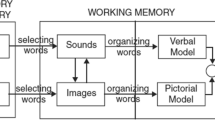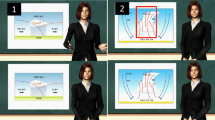Abstract
The use of video lectures has become a core feature of digital learning, but how the media diversity carried in videos affects learning experience has been rarely studied. Adopting a two-factor experimental design, this study used cognitive style questionnaires, brain wave detection, cognitive load scale, and post-test to explore the impacts of three commonly used algorithm-based video lectures on the sustained attention, learning engagement, cognitive load, and learning outcomes of verbal and visual style learners. The results show that cognitive style and video lecture type had a small effect on learners’ sustained attention and learning engagement levels; and visual learners demonstrated significantly higher attention and learning engagement levels in the animation group than in the Tablet drawing and PPT groups. Similarly, with the increase of media diversity, cognitive load also increased, but the increase did not reach a significant level. The study also found that media diversity had a small impact on learning outcomes, but cognitive style not. It further proved that cognitive load caused by moderate media diversity didn’t affect learning outcomes. This research provides a valuable reference for creating effective video lectures and significant support for researching video courses from neuroscience perspective.









Similar content being viewed by others
Data availability
The data that support the findings of this study are available from the corresponding author upon reasonable request.
References
Adarkwah, M. A. (2021). “I’m not against online teaching, but what about us?”: ICT in Ghana post Covid-19. Education and Information Technologies, 26, 1665–1685. https://doi.org/10.1007/s10639-020-10331-z
Azevedo, R. (2015). Defining and measuring engagement and learning in science: conceptual, theoretical, methodological, and analytical issues. Educational Psychologist, 50, 84–94. https://doi.org/10.1080/00461520.2015.1004069
Barut Tugtekin, E., & Dursun, O. O. (2022). Effect of animated and interactive video variations on learners’ motivation in distance education. Education and Information Technologies, 27(3), 3247–3276. https://doi.org/10.1007/s10639-021-10735-5
Babiker, A., Faye, I., Mumtaz, W., Malik, A. S., & Sato, H. (2019). EEG in classroom: EMD features to detect situational interest of students during learning. Multimedia Tools and Applications, 78(12), 16261–16281. https://doi.org/10.1007/s11042-018-7016-z
Blumenfeld, P. C., Kempler, T. M., & Krajcik, J. S. (2006). Motivation and cognitive engagement in learning environments. (R. K. Sawyer, Ed.), The Cambridge Handbook of the Learning Sciences. Cambridge University Press. https://doi.org/10.1017/cbo9780511816833.029
Brecht, H. D., & Ogilby, S. M. (2008). Enabling a comprehensive teaching strategy: video lectures. Journal of Information Technology Education Innovations in Practice, 7, 71–86. https://doi.org/10.28945/198
Chai, M. T., Saad, M. N. M., Kamel, N., & Malik, A. S. (2017). EEG analysis of color effects using effective connectivity based on graph theory during a multimedia learning task. In 2017 IEEE Life Sciences Conference (pp. 99–102).
Chang, J. J., Lin, W. S., & Chen, H. R. (2019). How attention level and cognitive style affect learning in a MOOC environment? Based on the perspective of brainwave analysis. Computers in Human Behavior, 100, 209–217. https://doi.org/10.1016/j.chb.2018.08.016
Chaouachi, M., & Frasson, C. (2010). Exploring the relationship between learner EEG mental engagement and affect. In Proceedings of the 10th International Conference on Intelligent Tutoring Systems (pp. 291–293). Springer.
Chen, C., & Sun, Y. (2012). Assessing the effects of different multimedia materials on emotions and learning performance for visual and verbal style learners. Computers & Education, 59(4), 1273–1285. https://doi.org/10.1016/j.compedu.2012.05.006
Chen, C., & Wu, C. (2015). Effects of different video lecture types on sustained attention, emotion, cognitive load, and learning performance. Computers & Education, 80, 108–121. https://doi.org/10.1016/j.compedu.2014.08.015
Cohen, J. (1988). Statistical power analysis for the behavioral sciences (2nd ed.). L. Erlbaum Associates.
Cohen J. (1992). A power primer. Psychological Bulletin, 112(1), 155–159. https://doi.org/10.1037//0033-2909.112.1.155
Costley, J., & Lange, C. (2017a). The effects of lecture diversity on germane load. International Review of Research in Open and Distance Learning, 18(2), 27–46. https://doi.org/10.19173/irrodl.v18i2.2860
Costley, J., & Lange, C. H. (2017b). Video lectures in e-learning: effects of viewership and media diversity on learning, satisfaction, engagement, interest, and future behavioral intention. Interactive Technology and Smart Education, 14(1), 14–30. https://doi.org/10.1108/ITSE-08-2016-0025
De Pesters, A., Coon, W. G., Brunner, P., Gunduz, A., Ritaccio, A. L., Brunet, N. M., Weerd, P., & De. (2016). Alpha power indexes task-related networks on large and small scales: a multimodal ECoG study in humans and a non-human primate. NeuroImage, 134, 122–131. https://doi.org/10.1016/j.neuroimage.2016.03.074
Fiorella, L., & Mayer, R. E. (2018). What works and doesn’t work with instructional video. Computers in Human Behavior, 89, 465–470. https://doi.org/10.1016/j.chb.2018.07.015
Gerlic, I., & Jausovec, N. (2001). Differences in EEG power and coherence measures related to the type of presentation: text versus multimedia. Journal of Educational Computing Research, 25(2), 177–195. https://doi.org/10.2190/YDWY-U3FJ-4LY4-LYND
Guo, P. J., Kim, J., & Rubin, R. (2014). How video production affects student engagement: an empirical studey of MOOC videos. In Proceedings of the first ACM conference on Learning. 41–50. https://doi.org/10.1145/2556325.2566239
Höffler, T., & Leutner, D. (2007). Instructional animation versus static pictures: a meta-analysis. Learning and Instruction, 17, 722–738. https://doi.org/10.1016/j.learninstruc.2007.09.013
Hong, J., Pi, Z., & Yang, J. (2020). Learning declarative and procedural knowledge via video lectures: cognitive load and learning effectiveness. Innovations in Education and Teaching International, 55(1), 74–81. https://doi.org/10.1080/14703297.2016.1237371
Hoogerheide, V., Visee, J., Lachner, A., & van Gog, T. (2019). Generating an instructional video as homework activity is both effective and enjoyable. Learning and Instruction, 64, 101226. https://doi.org/10.1016/j.learninstruc.2019.101226
Hsu, K. C. (2016). Social gamification in multimedia instruction: assessing the effects of animation, reward strategies, and social interactions on learner’s motivation and academic performance in online settings. University of Kansas.
Khedher, A. B., Jraidi, I., & Frasson, C. (2019). Tracking students’ mental engagement using EEG signals during an interaction with a virtual learning environment. Journal of Intelligent Learning Systems and Applications, 11(01), 1–14. https://doi.org/10.4236/jilsa.2019.111001
Kim, J., Kwon, Y., & Cho, D. (2011). Investigating factors that influence social presence and learning outcomes in distance higher education. Computers and Education, 57(2), 1512–1520. https://doi.org/10.1016/j.compedu.2011.02.005
Lackmann, S., Léger, P. M., Charland, P., Aubé, C., & Talbot, J. (2021). The influence of video format on engagement and performance in online learning. Brain Sciences, 11(2), 128. https://doi.org/10.3390/brainsci11020128
Leppink, J., Paas, F., van Gog, T., van der Vleuten, C. P. M., & van Merriënboer, J. J. G. (2014). Effects of pairs of problems and examples on task performance and different types of cognitive load. Learning and Instruction, 30, 32–42. https://doi.org/10.1016/j.learninstruc.2013.12.001
Liu, N. H., Chiang, C. Y., & Chu, H. C. (2013). Recognizing the degree of human attention using EEG signals from mobile sensors. Sensors (Switzerland), 13(8), 10273–10286. https://doi.org/10.3390/s130810273
Liu, Y., Ma, W., Guo, X., Lin, X., Wu, C., & Zhu, T. (2021). Impacts of color coding on programming learning in multimedia learning: moving toward a multimodal methodology. Frontiers in Psychology, 12(12), 1–13. https://doi.org/10.3389/fpsyg.2021.773328
Mathilde, B., & Ole, J. (2012). Alpha oscillations serve to protect working memory maintenance against anticipated distracters. Current Biology, 22(20), 1969–1974. https://doi.org/10.1016/j.cub.2012.08.029
Mayer, R. E., & Massa, L. J. (2003). Three facets of visual and verbal learners: cognitive ability, cognitive style, and learning preference. Journal of Educational Psychology, 95(4), 833–846. https://doi.org/10.1037/0022-0663.95.4.833
Meneses, L. J. C., Kruger, J. L., & Doherty, S. (2020). Validating theta power as an objective measure of cognitive load in educational video. Educational Technology Research and Development, 68(1), 181–202. https://doi.org/10.1007/s11423-019-09681-4
Ming, C., Chung, C., & Wu, H. (2015). Effects of different video lecture types on sustained attention, emotion, cognitive load, and learning performance. Computer & Education, 80, 108–121. https://doi.org/10.1016/j.compedu.2014.08.015
Mutlu-bayraktar, D., Cosgun, V., & Altan, T. (2019). Cognitive load in multimedia learning environments: a systematic review. Computers & Education, 141, 103618. https://doi.org/10.1016/j.compedu.2019.103618
Ni, D., Wang, S., & Liu, G. (2020). The EEG-based attention analysis in multimedia m-learning. Computational and Mathematical Methods in Medicine, 2020, 4837291. https://doi.org/10.1155/2020/4837291
Noetel, M., Griffith, S., Delaney, O., Sanders, T., & Lonsdale, C. (2021). Video improves learning in higher education: a systematic review. Review of Educational Research, 91(2), 003465432199071. https://doi.org/10.3102/0034654321990713
Ozel, P., Mutlu-Bayraktar, D., Altan, T., Coskun, V., & Olamat, A. (2021). Neuroimaging tools in multimedia learning: a systematic review. Interactive Learning Environments, 10. https://doi.org/10.1080/10494820.2021.1984255
Örün, Ö, & Akbulut, Y. (2019). Effect of multitaskin, physical environment and electroencephalography use on cognitive load and retention. Computers in Human Behavior, 92, 216–229. https://doi.org/10.1016/j.chb.2018.11.027
Paas, F., Renkl, A., & Sweller, J. (2003). Cognitive load theory and instructional design. Educational Psychologist, 38(1), 1–4. https://doi.org/10.1207/S15326985EP3801_1
Pi, Z., Zhang, Y., Zhou, W., Xu, K., Chen, Y., Yang, J., & Zhao, Q. (2020). Learning by explaining to oneself and a peer enhances learners’ theta and alpha oscillations while watching video lectures. British Journal of Educational Technology, 52(2), 659–679. https://doi.org/10.1111/bjet.13048
Roux, F., & Uhlhaas, P. J. (2014). Working memory and neural oscillations: alpha-gamma versus theta-gamma codes for distinct WM information? Trends in Cognitive Sciences, 18(1), 16–25. https://doi.org/10.1016/j.tics.2013.10.010
Sauseng, P., Klimesch, W., Doppelmayr, M., Pecherstorfer, T., Freunberger, R., & Hanslmayr, S. (2005). EEG alpha synchronization and functional coupling during top-down processing in a working memory task. Human Brain Mapping, 26, 148–155. https://doi.org/10.1002/hbm.20150
Schaufeli, W. B., Martinez, I. M., & Pinto, A. M. (2002). Burnout and engagement in university students: a cross-national study. Journal of Cross-Cultural Psychology, 33(5), 464–481. https://doi.org/10.1177/0022022102033005003
Tugtekin, U., & Odabasi, H. F. (2022). Do interactive learning environments have an effect on learning outcomes, cognitive load and metacognitive judgments? Education and Information Technologies, 27, 7019–7058. https://doi.org/10.1007/s10639-022-10912-0
Tversky, B., & Morrison, J. B. (2002). Animation: can it facilitate? International Journal of Human-Computer Studies, 57(4), 247–262. https://doi.org/10.1006/ijhc.1017
Wammes, J. D., Ralph, B. C. W., Mills, C., Bosch, N., Duncan, T. L., & Smilek, D. (2019). Disengagement during lectures: media multitasking and mind wandering in university classrooms. Computers & Education, 132, 76–89. https://doi.org/10.1016/j.compedu.2018.12.007
Wang, C., Fang, T., & Gu, Y. (2020a). Learning performance and behavioral patterns of online collaborative learning: impact of cognitive load and affordances of different multimedia. Computers & Education, 143(5), 103683. https://doi.org/10.1016/j.compedu.2019.103683
Wang, J., Antonenko, P., Keil, A., & Dawson, K. (2020b). Converging subjective and psychophysiological measures of cognitive load to study the effects of instructor present video. Mind Brain and Education, 14(3), 279–291. https://doi.org/10.1111/mbe.12239
Wöstmann, M., Lim, S. J., & Obleser, J. (2017). The human neural alpha response to speech is a proxy of attentional control. Cerebral Cortex, 27(6), 3307–3317. https://doi.org/10.1093/cercor/bhx074
Yang, J. M., Zhang, Y., Li, L., & Pi, Z. L. (2019). The Interaction of an instructor’s guided behaviors and learners’ prior knowledge in predicting learning from video. China Educational Technology, (7), 74–81.
Yang, Y. F. (2011). Engaging students in an online situated language learning environment. Computer Assisted Language Learning, 14, 181–198. https://doi.org/10.1080/09588221.2010.538700
Zhang, D., Zhao, J. L., Zhou, L., & Nunamaker, J. F. (2006). Can e-learning replace classroom learning? Communications of the ACM, 47(5), 75–79. https://doi.org/10.1145/986213.986216
Author information
Authors and Affiliations
Corresponding author
Ethics declarations
Ethical approval
All procedures performed in studies involving human participants were in accordance with the ethical standards of the institutional and national research committee and with the 1964 Helsinki declaration and its later amendments or comparable ethical standards.
Informed consent
Informed consent was obtained from all individual participants included in the study.
Conflict of interest
The authors declare that they have no conflict of interest.
Additional information
Publisher’s note
Springer Nature remains neutral with regard to jurisdictional claims in published maps and institutional affiliations.
Rights and permissions
Springer Nature or its licensor (e.g. a society or other partner) holds exclusive rights to this article under a publishing agreement with the author(s) or other rightsholder(s); author self-archiving of the accepted manuscript version of this article is solely governed by the terms of such publishing agreement and applicable law.
About this article
Cite this article
Lin, X., Tang, W., Ma, W. et al. The impact of media diversity and cognitive style on learning experience in programming video lecture: A brainwave analysis. Educ Inf Technol 28, 10617–10637 (2023). https://doi.org/10.1007/s10639-023-11608-9
Received:
Accepted:
Published:
Issue Date:
DOI: https://doi.org/10.1007/s10639-023-11608-9




